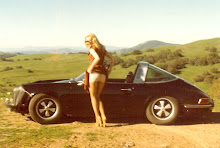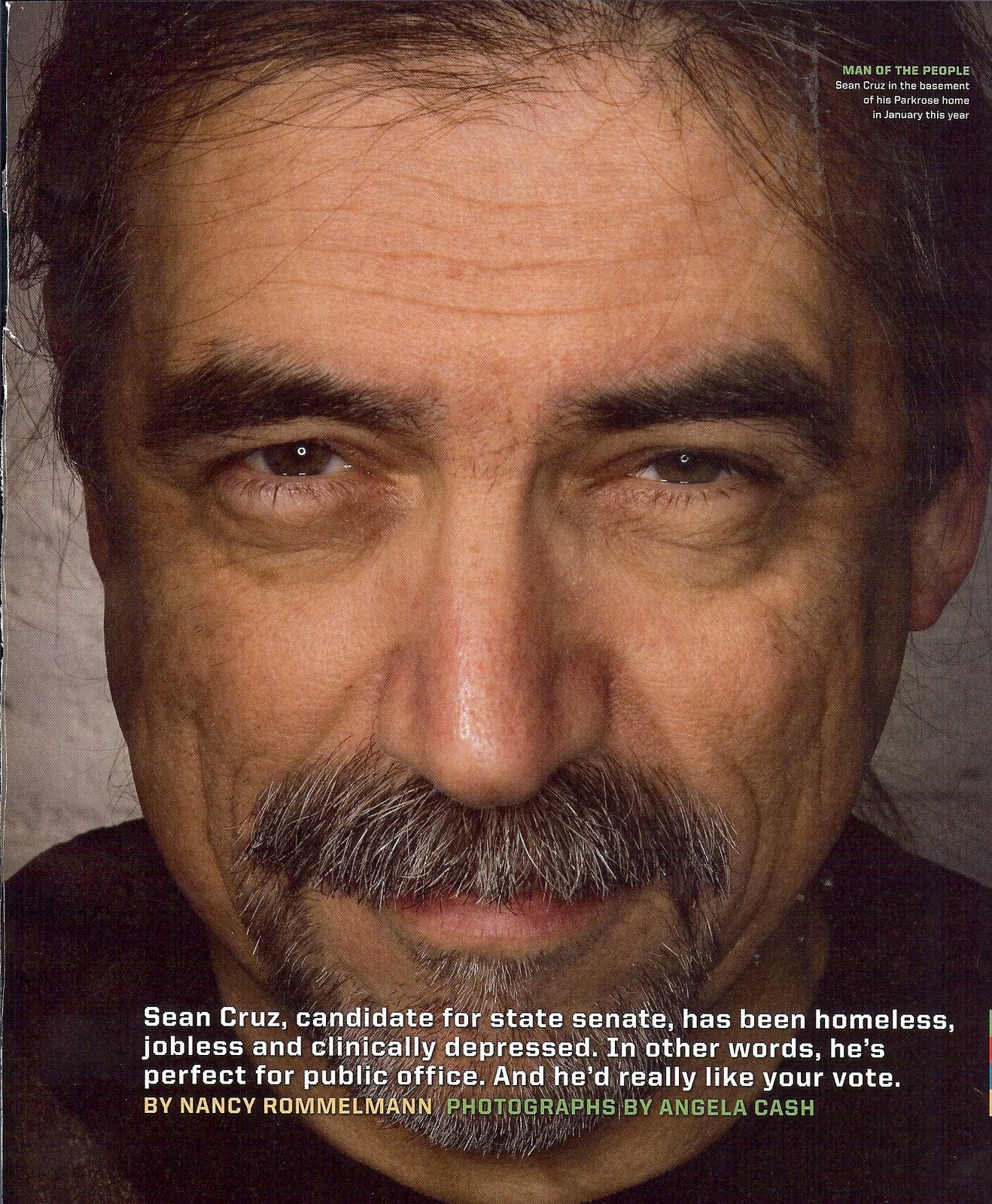Salem, Oregon April 23, 2007
Senate Rules Committee
Senator Kate Brown, Chair
Senator Ted Ferrioli, Vice-Chair
Senator Betsy Johnson
Senator Laurie Monnes Anderson
Senator David Nelson
Testimony on SM1, SJM6, SJM9, HJM9, related to the Iraq War
by Sean Cruz
April 23, 2007
Exhibits:
Photograph of Spc Tyler Cruz, unarmored humvee, 2004
Photograph of Spc Tyler Cruz, humvee with welded armor, 2004
Photograph of Spc Aaron Cruz, 2001
Certificate of recognition for Aaron Cruz, 2005
Letter from US Dept. of Veterans Affairs re Aaron’s medical records, 2005
Madame Chair, members of the Committee, for the record my name is Sean Cruz.
I do not intend to read all of my written testimony, which I have provided to the Committee. I would like to provide some foundational information and then stand aside for others to speak.
Mrs. Michele DeFord, a Gold Star Mother, whose son David Johnson was killed in Iraq , could not be here for this hearing, and has requested that I read her testimony into the record on her behalf.
I will do so at the Chair’s convenience, and otherwise will remain available to answer any questions the Committee may have about the legislation before you.
I appear before you today as the father of two Army National Guard soldiers, and as a member of the Northwest chapter of Military Families Speak Out ( MFSO ).
There are several MFSO members present to testify today, and we all speak equally for ourselves and as some of the faces of Military Families Speak Out.
I have been a resident of NE Portland for the past dozen years. For the past five of those years, my boys have been subject to combat deployment to the war in Iraq .
My sons are: Specialist Aaron Cruz, who died in 2005 at the age of 23, largely from medical neglect while he was under military orders, and Specialist Tyler Cruz, who has at this time—at the age of 21—so far—served two year-long deployments in combat in Iraq as a .50 caliber machine gunner on a humvee.
Sgt. David Johnson was killed doing the same job my son Tyler has done through two deployments in combat in Iraq .
I want to note for the record that my sons’ Army National Guard unit was first placed on alert in the Spring of 2002, ordered to pack for deployment to Iraq on 24 hours’ notice, and this April marks my family’s fifth year of continued, open-ended, actual participation in the catastrophe in Iraq .
I have provided five exhibits to the Committee to illustrate several points regarding the Iraq-related legislation before you.
These exhibits are:
(1) This early 2004 photograph of Tyler at the age of 19 shows him manning his .50 on a humvee with no armor or protection whatsoever. He is completely unprotected by even a windscreen.
(2) Later 2004 photographs such as this one showed that his unit, an engineering battalion, welded scrap steel plate for protection as best they could and, during that first deployment, he escorted convoys all over central Iraq and provided security for his unit under those conditions.
Tyler called me from the Baghdad area in 2004 and asked me if I’d heard of the “Highway to Hell.” Of course, I had.
“We paved it,” he told me, with a lot of pride in his voice. That’s my boy.
(3) This is a photograph of my son Aaron at the age of 18.
(4) This is the certificate, signed with George W. Bush, President of the United States ’ very own autopen, which reads:
“The United States of America honors the memory of Aaron A. Cruz. This certificate is awarded by a grateful nation in recognition of devoted and selfless consecration to the service of our country in the Armed Forces of the United States .”
(5) The last exhibit is a copy of the letter from the US Department of Veterans Affairs, dated November 2005, in response to my request for access to Aaron’s medical records. It reads:
“Mr. Cruz’s request will be forwarded to our privacy act officer for processing of his request. He should be advised that we have a large backlog of requests for copies of records and that it may take up to a year before his request is processed. This report of contact will be faxed and serve as a final response to this inquiry.”
For the record, I have heard nothing regarding my son since receiving this letter.
It is common knowledge that the medical system is overburdened and chaotic, and there is little expectation that it will receive either the funding or the commitment it needs in order to properly care for the injured coming back from the war.
I want also to note for the record that from April 21 until April 25, 2005 , I was absent from my job as Senator Avel Gordly ’s Legislative Aide during the 2005 legislative session.
For those five days, I was at my son Aaron’s bedside as he lay comatose in Utah . He was pronounced dead at 4:50 p.m. on April 25, 2005 .
His Utah Army National Guard unit’s entire officer and NCO staff turned out in full dress for Aaron’s memorial service and they presented his mother with a flag in his honor.
They spoke of his commitment to the unit and his despair at being left behind, due to his medical condition, which continued to deteriorate until he died.
His First Sergeant said that of the 200 soldiers he was taking to Iraq , most probably didn’t want to go, but here was one soldier who absolutely did want to go, and he couldn’t.
We buried Aaron on May 3, and 8 hours later, my son Tyler was on his way back to camp in Southern California to prepare for his second deployment to Iraq .
This is how we treat our soldiers and honor their service and their sacrifice in the real world we military families are living in.
Tyler served his second deployment in Ramadi, in Al Anbar province.
During that year, of the 4,000 soldiers and Marines fighting in Ramadi, 75 were killed and more than 1,000 were serious casualties, including many cases of Traumatic Brain Injury, or TBI, the signature injury of this war.
What has been said about the living conditions for those troops is that they lived in squalor, under fire every day and every night.
During that year, no day and no night passed without my being aware that my son—the one son I have left—could be killed or severely injured at any moment.
Aaron did not die as a result of combat in Iraq , as he would have much preferred.
He died from a life-threatening seizure disorder for which he was receiving treatment while he was living with me in our home in Portland , prior to his 2003 Iraq deployment orders.
A few days after Aaron left, a letter from one of his Portland doctors arrived in the mail, warning him that he could suffer a seizure that could put him in a coma from which he would not recover, and that is in fact what happened to my son.
He concealed his medical conditions from his unit as best he could, and he called me to tell me that he had passed the Army medical exam and was going to Fort Carson , Colorado .
But Aaron was held back for at least one of the several serious medical conditions he was suffering from. As near as I can tell, he received no continuing medical treatment after he left my home and reported to his unit.
Two years later, I have no information from anyone about what happened to him medically between leaving my home and suffering the fatal seizure.
Senate Memorial 1, in line 17 page 1, refers to the deaths of 83 military personnel “from Oregon” in connection with the wars in Iraq and Afghanistan, and I want to note for the record that this number does not include my son, Aaron Cruz, although he was an Oregon resident at the time he reported for deployment.
The way this war is compartmentalized, if your soldier doesn’t die from gunfire or in an explosion, he or she isn’t a real casualty of the war, and if the soldier is from another state’s National Guard, no one pays much attention to the loss.
Now the President has announced that troops are being rotated back into Iraq again, for deployments extended to 15 months.
We military families are seeing our loved ones exposed to chlorine gas bombs now, and to shaped-charge IEDs that cut right through armor. We are seeing our troops ordered into neighborhoods, as Representative Brian Boquist described, where the streets are too narrow for the tanks and combat support vehicles they need.
The lifetime medical costs to care for some of the brain-injured soldiers returning from battle can run to $ 8 to $ 14 million dollars. Where is that money going to come from?
Will this legislature back its message to Congress with a commitment to provide the funding level that our troops, our veterans and their families need as a consequence of being a “Nation at War.?”
Is—for example—a nickel per gallon gas tax too much to ask of the Nation to help pay for the war, to finance veterans’ services for the small fraction of Americans who are actually fighting it?
I am not here to advocate for any of these Memorials as the one to support.
I believe that they each contain important concepts that merit consideration and debate by the full Senate, and I hope this Committee will decide to move them all to the floor, including HJM9, so that they can have that debate, and then bring them back to this Committee for further action.
Regarding Senate Memorial 1, I would ask the Committee to remove the platitudes from the bill.
For example, on page 1, lines 13 and 14, which read: “Whereas the Oregon Senate and the residents of the State of Oregon recognize, appreciate and are forever thankful for the sacrifices that all of our Oregon and other American troops and their families have made, especially the troops who have given their lives or been wounded to protect our freedoms.”
This expression of gratitude rings especially hollow on a day in which flags are at half-staff to mark the loss of life of another Oregon soldier, but which received no acknowledgement, no remonstrance, on the Senate floor.
A second example is found on page 2, lines 16 and 17, which read: “The Oregon Senate and the American people will continue to support and protect the members of the United States Armed Forces and the Oregon National Guard….”
I have no idea what that means, neither when that support and protection is going to begin, nor what level of commitment the bill refers to.
With that statement, Madame Chair and Members of the Committee, I will stand aside so that others may speak.






